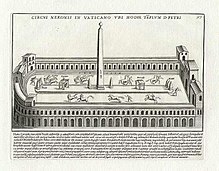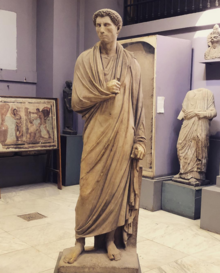User:6ixmane

The Obelisk of Domitian is an obelisk is a vertically stretched pyramid from 5m to 39m long. They are brought over from Ancient Egypt on Specialized Ships and very Infamous Emperor's like Caligula have brought Egyptian Obelisk to Rome. In front of the Pantheon, you can admire the Macuteo Obelisk, an Egyptian obelisk 6.34 meters high that reaches 14.52 meters with the base and the cross. Emperor Domitian had it transported to Rome to decorate the temple dedicated to Isis and Serapis in Campo Marzio, where it was found in 1373.

Nero famously had one in the middle of his circus track that now on the same grounds as the Vatican, and actually still sits there at St Peter Square in Vatican City, Rome.
Obelisks where really sought after in Antiquity and especially after Rome came to Egypt in the First Century BC.

For Egyptians, the obelisk was a reverential monument, commemorating the dead, representing their Pharaoh's, and honoring their gods. These monuments were representational in both structure and arrangement, serving as monuments with a complete structure of understanding.
The tekhenu, identified as obelisks in present times, were recognized by the ancient Egyptians and initially mentioned in historical records approximately in
2575 BC. An obelisk can be described as a tall and slender structure with four sides that gradually narrow down into a pyramid shape at the pinnacle. Obelisks were commonly made using red granite or a similar type of stone and following a specific procedure that aimed to create a monument with the greatest possible height while using a minimal-sized base. While the earliest obelisks stood at just over 3 meters or approximately 10 feet tall, they progressively grew taller, eventually reaching heights of around 30 meters or approximately 100 feet. I'm sorry, but you haven't provided any text for me to paraphrase. Could you please provide the text you would like me to work with?
EGYPTIAN CULTURE IN ANCIENT ROME.
The Roman empire's conquest of Egypt and its integration marked the beginning of a fresh fascination with the ancient Egyptian culture. Roman forums were adorned with obelisks, architecture, and sculpture in an Egyptian style. The worship of Isis, the Egyptian mother goddess, greatly influenced the entire empire.
Around 58 BCE, Rome started experiencing an increase in Egyptian influence, which occurred during a tumultuous time of civil unrest. The root cause of this turmoil was primarily the intense rivalry between Octavian (who later beinfluenced.own as Augustus) and Mark Anthony and Cleopatra VII in Egypt.
Due to this disagreement, the artistic expressions of Egypt, which were frequently acquired as plunder, frequently maintained their foreign character to the people of Rome.
Octavian frequently vilified certain aspects of Egyptian culture and a large portion of the Roman populace had minimal comprehension of the Egyptian language or the symbolism employed in their artwork.

